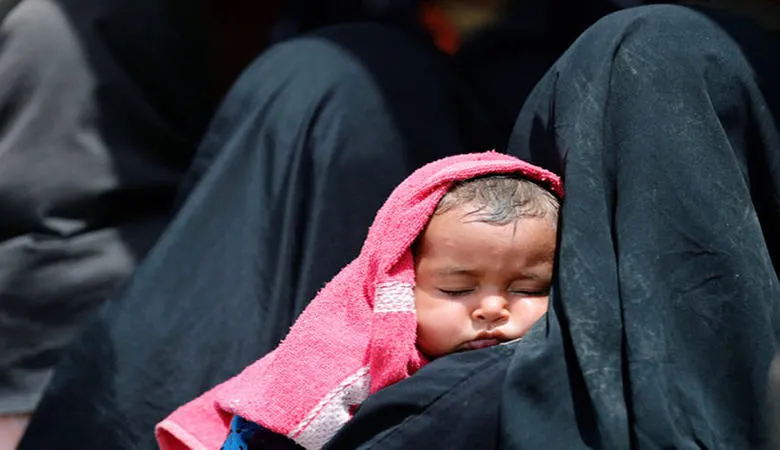23 July 2018
First global analysis reveals significant role for women & minors in Islamic State
A report launched today reveals that women and minors (aged under 18) account for up to 25 per cent of the foreign citizens who became affiliated with Islamic State in Iraq and Syria. This is a greater proportion than previously thought and likely to be a vast underestimation, given gaps that remain in the data.

A report launched today reveals that women and minors (aged under 18) account for up to 25 per cent of the foreign citizens who became affiliated with Islamic State in Iraq and Syria. This is a greater proportion than previously thought and likely to be a vast underestimation, given gaps that remain in the data.
The study, undertaken by the International Centre for the Study of Radicalisation(ICSR), based within the Department of War Studies, Faculty of Social Science & Public Policy at King’s, involved the first and largest original dataset of its kind. Unique in its scale and scope, the dataset reveals that the number of foreign women and minors who travelled to, or were born into, Islamic State (IS) in Iraq and Syria between April 2013 and June 2018 has been significantly underestimated.
Speaking in advance of the launch, Dr Shiraz Maher, Director of the ICSR, said: “These findings are significant as considerations of foreign IS-affiliates in Syria and Iraq have largely focused on the status and activities of its male members.”
The ICSR’s report, From Daesh to ‘Diaspora’: Tracing the Women & Minors of Islamic State, has significant implications for policy and practice. Terrorist incidents across the globe have already revealed the threat posed by women and minors affiliated with and inspired by IS, with numerous foiled and successful attacks. In the future, the researchers recommend, women and minors must be recognised as distinct and complex groups in all efforts to respond to and counter violent extremist organisations.
Dr Maher said: “women and minors are poised to play a significant role in carrying on the ideology and organisation of IS now that the ‘caliphate’ has fallen, so it is essential that governments recognise these affiliates as two distinct groups who need their own unique responses.”
The researchers from the ICSR who produced the dataset and analysis, Dr Joana Cook and PhD candidate Gina Vale, recorded 41,490 citizens from 80 countries as foreign affiliates to IS between 2013 and 2018. Of the total, 13 per cent were women and 12 per cent were minors. 70 per cent of the foreign IS affiliates from Eastern Asia were found to be women and minors whilst women and minors also accounted for almost half of those who travelled from Eastern and Western Europe. Overall, women were from very diverse backgrounds with diverse motivations. At least 730 minors were also recorded as born to foreign parents, 566 from Western Europe alone, though this is estimated to be much higher.
Along with the unique analysis of gender and age amongst IS foreign affiliates, the report is the first to map out in detail the diverse trajectories of IS foreign affiliates after the fall of the ‘caliphate’ (the land held and administered by IS) at the end of 2017.
The analysis reveals that up to 20 per cent of IS foreign affiliates, 7,366 people, have either returned to their home countries or are in the process of repatriation to do so. Four per cent of these are recorded as women, whilst 17 per cent of those returning (or in the process of returning) are recorded as minors. However, significant discrepancies in accounting for foreign citizens in Iraq and Syria means it is difficult to assess the true numbers in each group.
“There has never been a more pertinent time to recognise and integrate gender and minor considerations into all streams of effort to counter IS”, commented the authors. Women and minors must be considered at ‘every step of the way’ in efforts by multiple agencies, governments and organisations to identify, manage and respond to affiliates of IS, in Syria, in Iraq and in affiliates’ home and third- party countries, suggests the report.
Significantly, the report indicates a ‘gross lack of data’ for many countries, suggesting that the analysis is likely to be an under-estimate of both the number of IS foreign affiliates and the potential threat posed by women and minors. In particular, although Libya, Afghanistan and the Philippines have proven notable destinations for women and minors in IS, these remain under-examined. Commenting on the need for further research, Dr Cook stated: “we hope this report encourages similar future analysis so that we can understand and counter IS and its underlying ideology.”
The report was presented to the executive body which supports the Counter-Terrorism Committee of the UN Security Council (the UNCTED) on 18 July and launched at King’s at an event at 17.00 on 23 July 2018.
